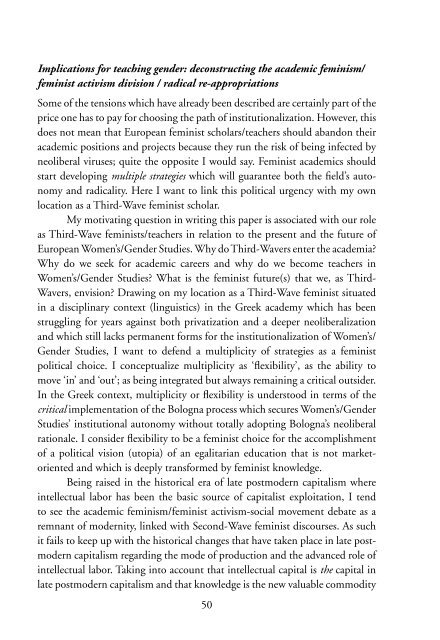Teaching with the third wave new feminists - MailChimp
Teaching with the third wave new feminists - MailChimp
Teaching with the third wave new feminists - MailChimp
Create successful ePaper yourself
Turn your PDF publications into a flip-book with our unique Google optimized e-Paper software.
Implications for teaching gender: deconstructing <strong>the</strong> academic feminism/feminist activism division / radical re-appropriationsSome of <strong>the</strong> tensions which have already been described are certainly part of <strong>the</strong>price one has to pay for choosing <strong>the</strong> path of institutionalization. However, thisdoes not mean that European feminist scholars/teachers should abandon <strong>the</strong>iracademic positions and projects because <strong>the</strong>y run <strong>the</strong> risk of being infected byneoliberal viruses; quite <strong>the</strong> opposite I would say. Feminist academics shouldstart developing multiple strategies which will guarantee both <strong>the</strong> field’s autonomyand radicality. Here I want to link this political urgency <strong>with</strong> my ownlocation as a Third-Wave feminist scholar.My motivating question in writing this paper is associated <strong>with</strong> our roleas Third-Wave <strong>feminists</strong>/teachers in relation to <strong>the</strong> present and <strong>the</strong> future ofEuropean Women’s/Gender Studies. Why do Third-Wavers enter <strong>the</strong> academia?Why do we seek for academic careers and why do we become teachers inWomen’s/Gender Studies? What is <strong>the</strong> feminist future(s) that we, as Third-Wavers, envision? Drawing on my location as a Third-Wave feminist situatedin a disciplinary context (linguistics) in <strong>the</strong> Greek academy which has beenstruggling for years against both privatization and a deeper neoliberalizationand which still lacks permanent forms for <strong>the</strong> institutionalization of Women’s/Gender Studies, I want to defend a multiplicity of strategies as a feministpolitical choice. I conceptualize multiplicity as ‘flexibility’, as <strong>the</strong> ability tomove ‘in’ and ‘out’; as being integrated but always remaining a critical outsider.In <strong>the</strong> Greek context, multiplicity or flexibility is understood in terms of <strong>the</strong>critical implementation of <strong>the</strong> Bologna process which secures Women’s/GenderStudies’ institutional autonomy <strong>with</strong>out totally adopting Bologna’s neoliberalrationale. I consider flexibility to be a feminist choice for <strong>the</strong> accomplishmentof a political vision (utopia) of an egalitarian education that is not marketorientedand which is deeply transformed by feminist knowledge.Being raised in <strong>the</strong> historical era of late postmodern capitalism whereintellectual labor has been <strong>the</strong> basic source of capitalist exploitation, I tendto see <strong>the</strong> academic feminism/feminist activism-social movement debate as aremnant of modernity, linked <strong>with</strong> Second-Wave feminist discourses. As suchit fails to keep up <strong>with</strong> <strong>the</strong> historical changes that have taken place in late postmoderncapitalism regarding <strong>the</strong> mode of production and <strong>the</strong> advanced role ofintellectual labor. Taking into account that intellectual capital is <strong>the</strong> capital inlate postmodern capitalism and that knowledge is <strong>the</strong> <strong>new</strong> valuable commodity50
















